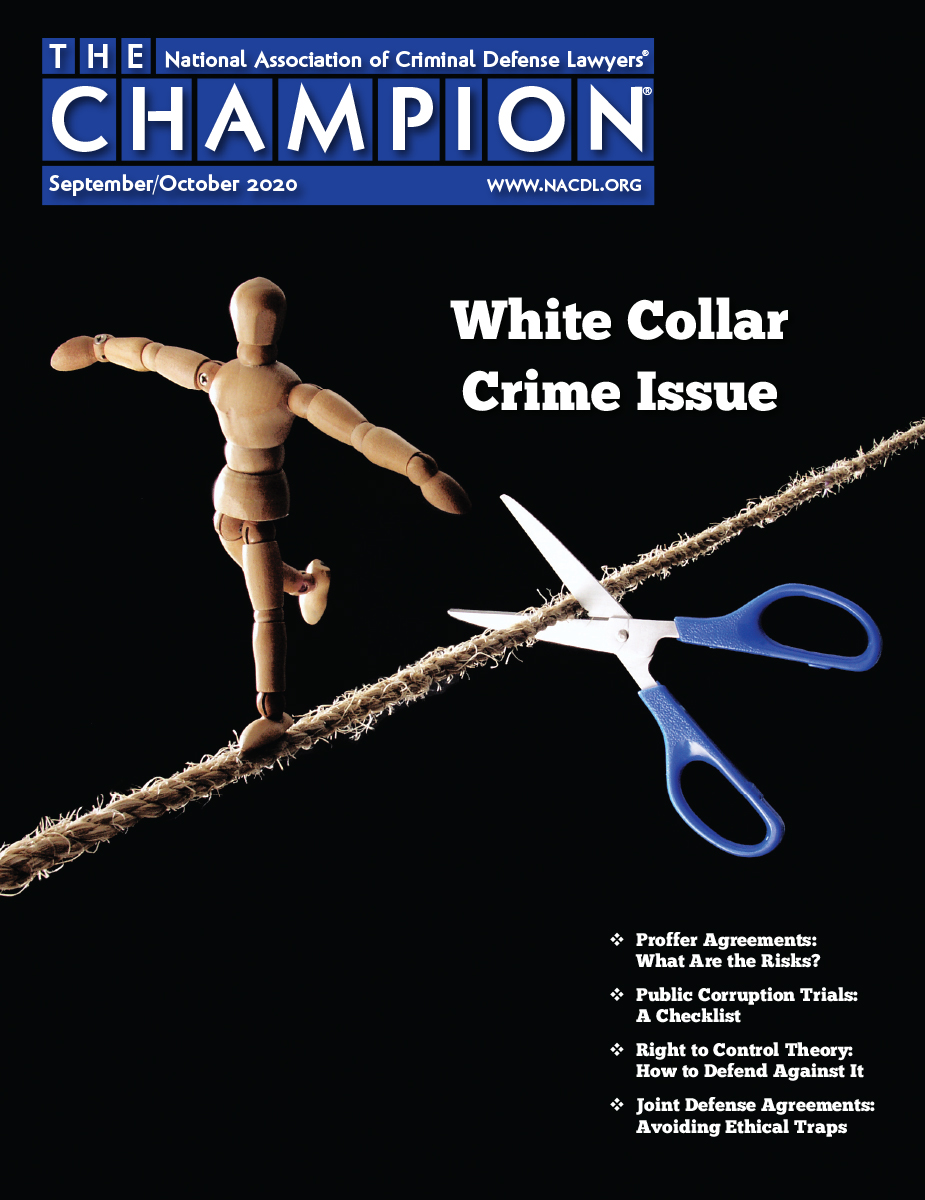September/October 2020

What are the shortcomings and pitfalls of proffer agreements?
Articles in this Issue
-
A Survey of Federal Proffer Agreements:
The Shortcomings and Pitfalls in the Government’s Promised Protections
Proffer agreements may appear to extend some assurance to the defense that statements made during a proffer will not be used against the potential defendant in the future. A closer examination, however, may reveal that the shelter they provide is far less than it might seem. It is important to approach such interviews with caution.
-
Affiliate News
What events are NACDL affiliates hosting this month? Find out here.
-
Book Review: Disloyal: A Memoir by Michael Cohen
This month John Wesley Hall reviews Disloyal: The True Story of the Former Personal Attorney to President Donald J. Trump by Michael Cohen.
-
Book Review: The Cadaver King and the Country Dentist by Radley Balko and Tucker Carrington
This month Matthew T. Mangino reviews The Cadaver King and the Country Dentist: A True Story of Injustice in the American South by Radley Balko and Tucker Carrington.
-
Cross Country: Wheeling the Factual Assertion
When “wheeling” the factual assertion as a destructive cross-examination technique, the defense attorney’s goal is to undermine belief in the “hub” fact. The hub fact is testimony that lacks credibility. Defense counsel then causes the witness to discuss “spoke” facts that are logically inconsistent with the hub fact.
-
From the President: A Moment for Change
George Floyd’s death has brought about a time when change in the criminal justice system is possible. Fortunately, this movement includes a growing number of prosecutors.
-
Getting Scholarship Into Court Project
The “Getting Scholarship Into Court Project” brings helpful law review articles and other writings to the attention of criminal defense attorneys. The project’s purpose is to identify scholarship that will be especially useful to courts and practitioners. Summarized on this page are articles the project’s advisory board recommends that practicing lawyers take the time to read.
-
NACDL News: Full Disclosure Project Launched to Expose Law Enforcement Misconduct
NACDL News for September/October 2020
-
NACDL News: Special Guests and Awardees at NFCJ Gala Justice for All. Justice Now.
NACDL News for September/October 2020
-
Practice Points: Joint Defense Agreements:
An Ounce of Prevention Can Be Worth a Pound of Cure, Especially When Careful Planning Avoids Ethical Pitfalls
Defense attorneys Andrew Boutros and John Schleppenbach provide proactive guidance for white collar practitioners on avoiding ethical traps – such as a potential conflict of interest – when entering into joint defense agreements.
-
The Public Corruption Trial: A Checklist
Few areas in the white collar world are in as much upheaval as law and practice under the federal honest services statute, but public corruption investigations continue at a quick pace. The authors provide practical suggestions about how to shape and present a defense – from a theory of the case and in limine motions to jury instructions and post-trial advocacy.
-
The Right to Control Theory — What It Is, How It Is Used, and How to Defend Against It
Jennifer Bouriat provides an overview of the mail and wire fraud statutes and the right to control theory, a brief history of the pertinent case law that has shaped the theory, and an overview of the circuit split on the validity of the theory. She offers key points to consider in defending a mail and wire fraud case.
-
White Collar Crime Policy: Supreme Court Vacates Sineneng-Smith Decision
Ruling Immigration Law Unconstitutionally Overbroad, But Door Remains Open for Future Challenges
The Supreme Court in Sineneng-Smith did not directly rule against the argument that 8 U.S.C. § 1324(a)(1)(A)(iv) is unconstitutionally overbroad. But it is possible that this statute may be challenged in the future.
